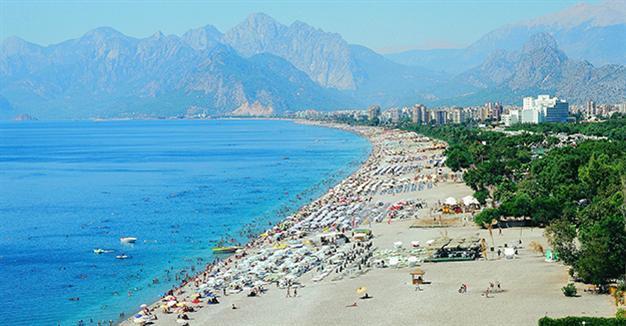Turkish Airlines wants task force to enliven tourism sector
Güneş Kömürcüler - ISTANBUL

Turkish Airlines CEO Temel Kotil has called for tourism representatives to create a task force and to focus on Asia and Africa as the sector players have voiced their concerns amid escalating risks affecting the country’s tourist numbers.
“What we all need to do is to seek new markets together. Let’s join our forces to invite tourists from Asian and African countries to Turkey. The money will be hands of these countries in the future, when Istanbul will become one of the biggest mega-hubs of the world,” he said at the 22nd general board meeting of the Hoteliers Association of Turkey (TÜROB).
Kotil noted that the tourism sector may have some problems right now, but things will recover as Turkey has steadily been becoming a hub.
“While the number of air passengers in Turkey was 19.6 million in 1994, this number has increased to 123 million in 2014. This figure is expected to increase up to 381 million in 2034, enabling Turkey to reach around 5.4 percent of the world’s air traffic. This is an incredible growth story as the same report has projected North Africa’s share will be around 19 percent, just four-times higher than Turkey’s,” he said, adding that Turkish Airlines has become Europe’s best airline. He said this year the company will focus on Latin America and is growing both in Asia and Africa quite rapidly.
“We’ll do whatever it is necessary to support Turkey’s tourism. We have already had charter flights between Saudi Arabia and the Black Sea provinces for example. We also plan to increase the number of direct flights to Antalya from many countries by this summer after a series of meeting with sector representatives,” he noted.
Concerned, but not in ‘crisis mode’
TÜROB President Timur Bayındır said the association has been concerned about the escalating geopolitical and security risks over the sector, but is not in “crisis mode,” calling for the initiation of a number of measures to overcome hurdles. Suggested measures include increasing the number of transit passengers who find accommodation in Turkey and tax cuts for sector players.
“The recent negative developments in our neighboring region, namely terror attacks and political tensions, have triggered concerns in our sector. We have been concerned about the recent developments, but as TÜROB, we [do not perceive] a crisis. In the face of these negativities, a number of key measures need to be taken immediately to protect the sector and tourism jobs and to remain competitive,” he said.
Bayındır then mentioned a few measures that have already been submitted to the related ministries.
Measures include cuts and postponement in employment taxes, around 50 percent of treasury warranty in loan rates and some discounts in other taxes, just as is the case for exporters.
Bayındır said tourism investments in Turkey have surpassed $75 billion with over 1.3 million units of bed capacity.
“Only in the last two years, more than $3.5 billion was invested in the sector. The investments are expected to reach $90 billion by 2023 with over 1.3 million jobs,” he said, adding the current sector issues should be seen as opportunities to make required reforms in the sector, such as diversification so as to lure more health, winter and “green” tourists.
He also expressed the highly lucrative opportunity that transit flight passengers offer through an extension of their time in Turkey.
“Some 54 percent of outbound-flight passengers in our airports, approximately 14 million passengers annually, pass through our country not ‘even drinking one glass of water.’ We aim to realize a project to lure transit air passengers to stay in Turkey in cooperation with the Tourism Ministry, the Ministry of Foreign Affairs and Turkish Airlines. Even 1 million additional overnight stay will add $1.8 billion extra revenue to the sector,” he said.
In 2015 as a whole, Turkey’s tourism revenues fell 8.3 percent, reaching $31.46 billion amid a huge decrease in the number of Russian and European tourists.
Bayındır also thanked Tourism Minister Mahir Ünal for the recent $6,000 financial support for each airplane that carrying 100 or more tourists from foreign countries to airports in Antalya, Alanya, Bodrum, Dalaman, İzmir and Kütahya in April and May 2016.
“We expect the extension of this measure to all airports in Turkey for a wider period of time,” he noted.
 Turkish Airlines CEO Temel Kotil has called for tourism representatives to create a task force and to focus on Asia and Africa as the sector players have voiced their concerns amid escalating risks affecting the country’s tourist numbers.
Turkish Airlines CEO Temel Kotil has called for tourism representatives to create a task force and to focus on Asia and Africa as the sector players have voiced their concerns amid escalating risks affecting the country’s tourist numbers.